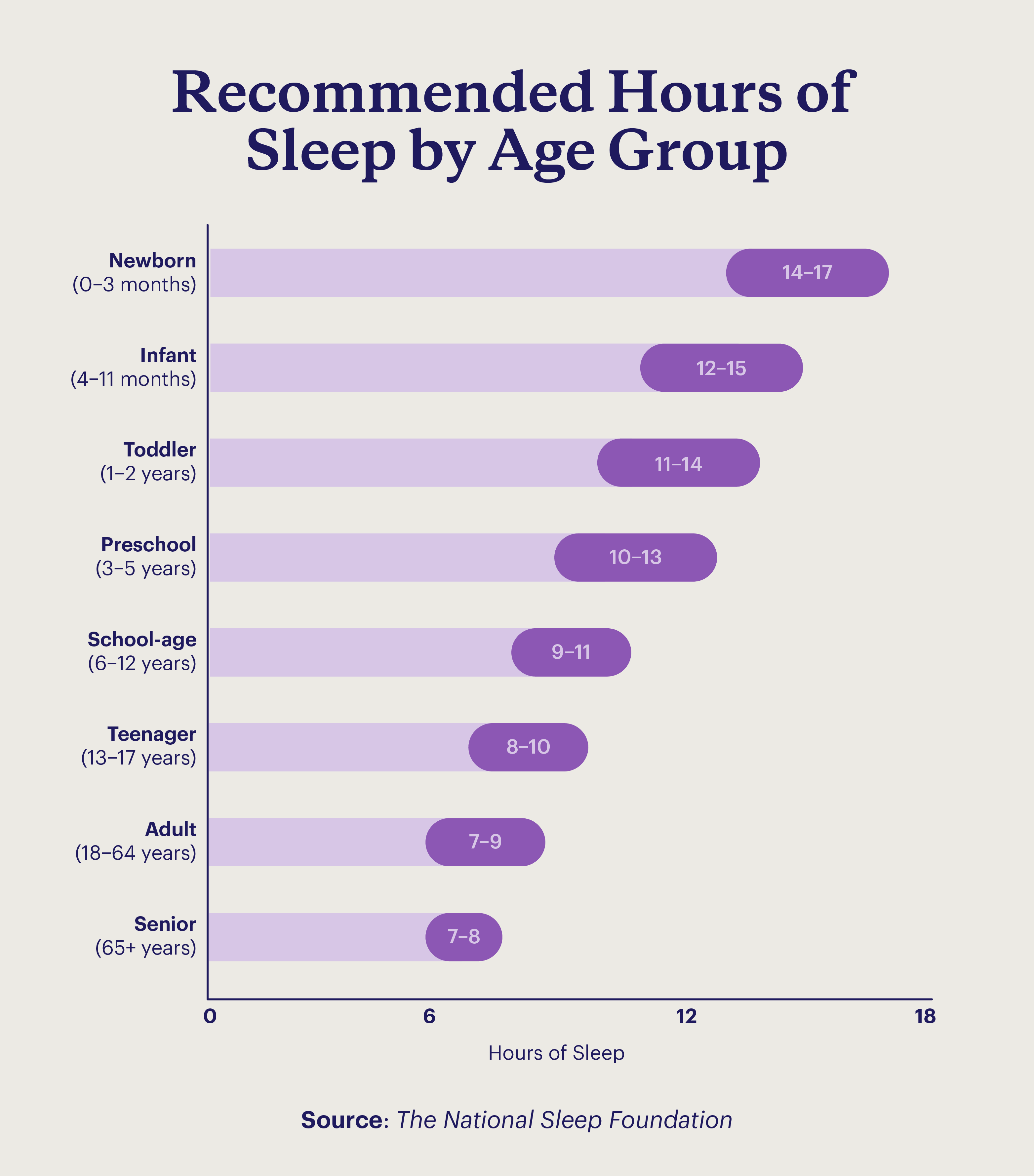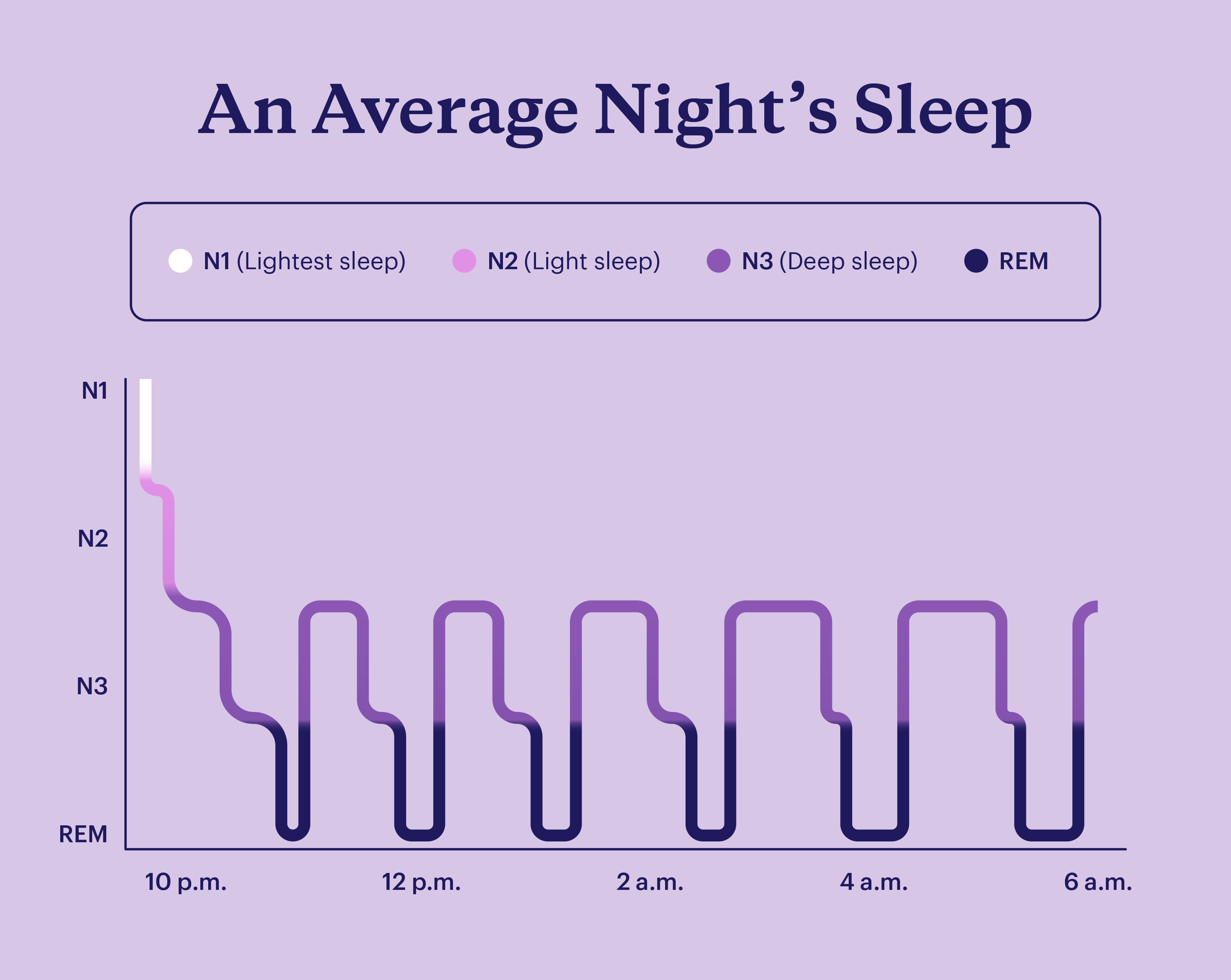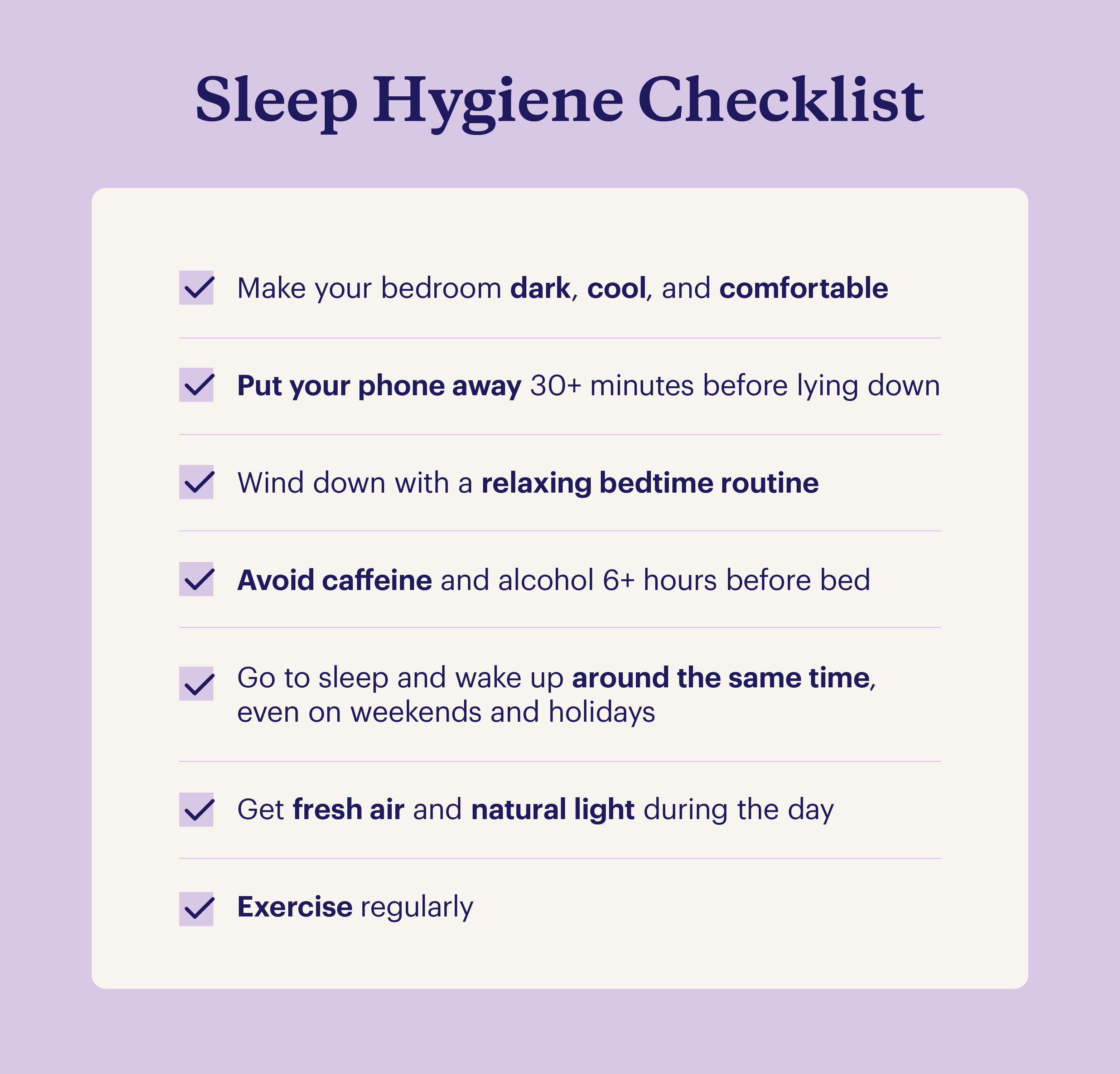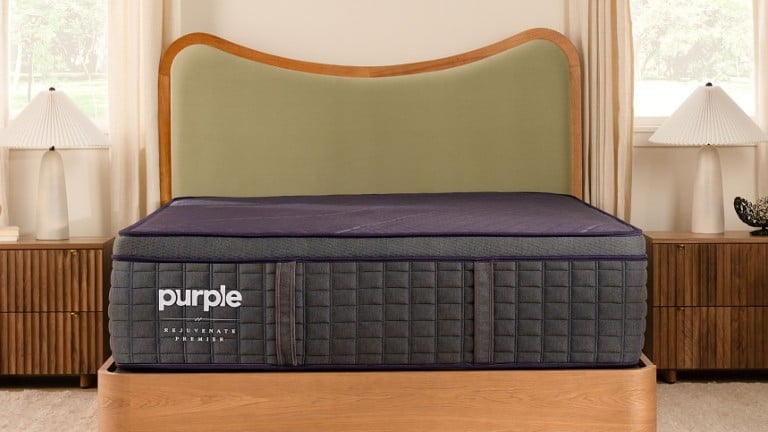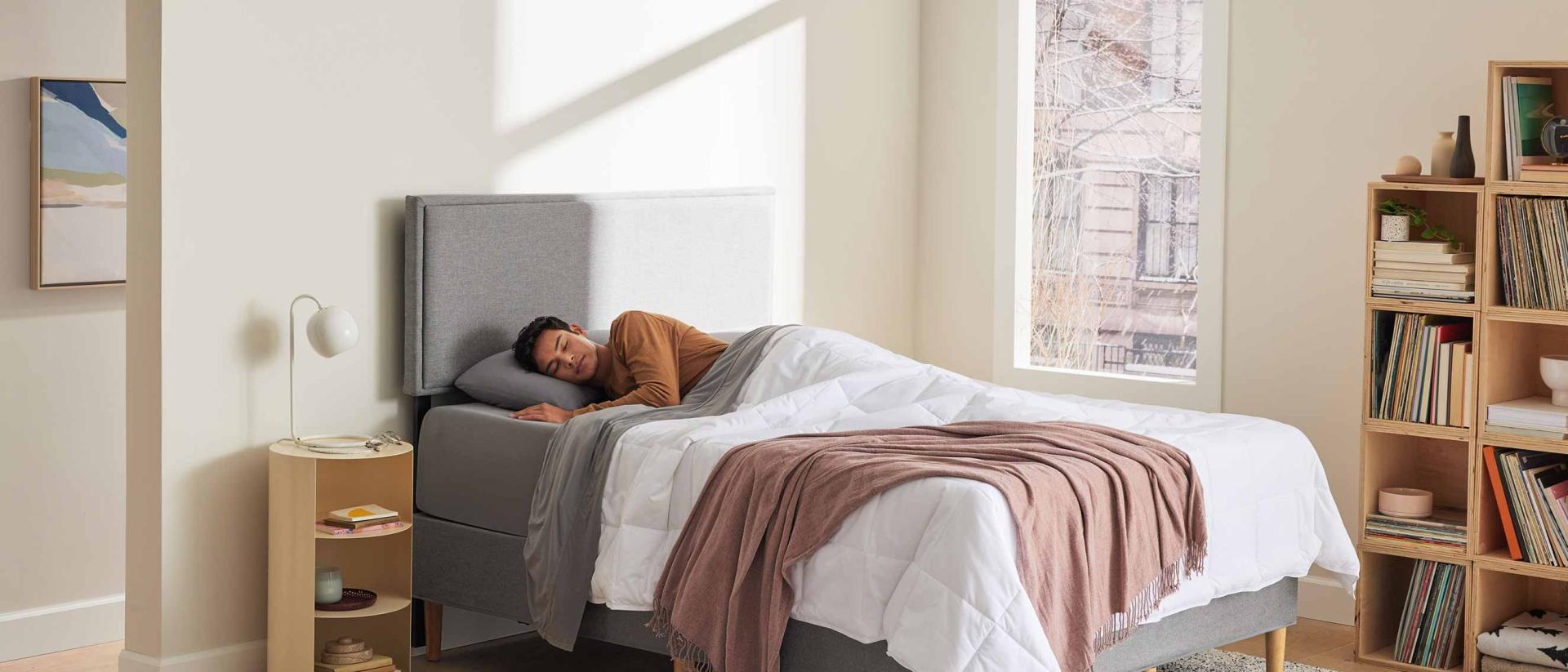
Sleep Calculator: How Much Sleep Do You Need? + Your Ideal Sleep Schedule
How much sleep do I need?
- The amount of sleep you need primarily depends on your age group.
- Teens and adults typically need at least seven hours of sleep a night, whereas younger children need 10-12 hours.
- A consistent sleep schedule that allows you to complete four to six sleep cycles is often sufficient for most adults to feel well-rested.
If you regularly wake up tired or can’t fall asleep, you may need to adjust your sleep schedule to improve the quality of your sleep. Using a sleep calculator can help you determine how much sleep you actually need, when you should go to bed, and when you should wake up based on your age, lifestyle, and unique needs.
Sleep Calculator
Find options for your ideal sleep schedule with our sleep cycle calculator. All you need to do is:
- Choose your age range.
- Select whether you want to determine your ideal bedtime or wake-up time.
- Input when you want to wake up or fall asleep.
- Get recommendations for when to wake up or go to sleep.
Using a sleep time calculator can help you set a restful sleep schedule that suits your lifestyle.
How Many Hours of Sleep Do You Need?
The National Sleep Foundation advises that you should get different amounts of sleep based on your age.1 As we get older, we generally need less sleep, though individual needs may vary.
But how much sleep you need every day depends on many factors, and recommended hours of sleep by age is only one piece of the puzzle. Your sleep schedule should be personalized to what you need and prefer, but research suggests you should generally aim for the recommended range for your age group.2
If you’re trying to fix your sleep schedule or wondering if four hours of sleep is enough (spoiler: it usually isn’t), consult the sleep chart by age below to determine how much sleep you should aim to get each night.
Age Group | Age Range | Recommended Daily Sleep |
Newborn | 0-3 months | 14-17 hours |
Infant | 4-11 months | 12-15 hours |
Toddler | 1-2 years | 11-14 hours |
Preschool | 3-5 years | 10-13 hours |
School-age | 6-12 years | 9-11 hours |
Teenager | 13-17 years | 8-10 hours |
Adult | 18-64 years | 7-9 hours |
Older adult | 65+ years | 7-8 hours |
Adjusting Your Sleep Schedule: When To Sleep and Set Your Alarm
Knowing how many hours of sleep you need is only the beginning. Adjusting your sleep schedule to meet your sleep needs means setting and sticking to appropriate bedtimes and wake-up times to the best of your ability.
Whether you’re changing the time you go to sleep or wake up, or if you’re completely overhauling your sleep schedule, make sure you account for the recommended amount of sleep for your age group as well as your unique needs and preferences.
What Time Should I Go To Bed?
Once you determine how much sleep you need each night, identifying when you should go to bed becomes easier. Deciding your ideal bedtime depends on your:
- Wake-up time: If you have to get up by a certain time, you can work backward and plan to go to bed at a time that ensures you get enough sleep.
- Circadian rhythm: Your circadian rhythm controls the production of melatonin in your body, and factors like your habits, sleep environment, and working shift can affect when you feel tired.
- Personal preference: If you’re a night owl or early bird, you can adjust your sleep schedule enough to get plenty of rest without changing your lifestyle.
When choosing a time to go to bed, remember that it typically takes people around 15 minutes to fall asleep. Ultimately, you should listen to your body, adopt a bedtime routine, and take steps to create a relaxing sleep environment so you can sleep well and wake up refreshed.
What Time Should I Wake Up?
For most people, the best time to sleep and wake up depends on your daily schedule, whether that’s when you need to go to work, attend class, or start running errands. The best time to wake up for you should account for:
- Bedtime: When setting your wake-up time, consider when you go to bed to make sure you can get enough sleep between when you lie down and get up.
- Lifestyle: Whether you like staying up late or getting up before dawn, your wake-up time should account for your nighttime and morning preferences, habits, and obligations.
- Sleep cycles: Waking up in the middle of a sleep cycle can lead to grogginess. Aim for a set number of cycles (4-6) to avoid sleep disruptions.
When choosing when to wake up, opt for consistency in your schedule. Sticking to a set wake-up time can help you maintain your circadian rhythm and get the amount and quality of sleep you need. A consistent morning routine can even make it easier to wake up as you get used to this schedule.
Understanding the Sleep Cycle
When you sleep, your body goes through four stages of sleep categorized by rapid eye movement (REM) and non-rapid eye movement (NREM). In order to feel rested, your body needs to complete several sleep cycles each time you go to sleep.
Typically, you will go through four to six cycles throughout the night. Waking in the middle of a cycle, especially during NREM sleep, can be disruptive and may result in grogginess, negative mood, and low performance.3
Sleep Stage | Sleep Type | Length |
Stage 1 | NREM | 1-7 minutes |
Stage 2 | NREM | 10-60 minutes |
Stage 3 | NREM | 20-40 minutes |
Stage 4 | REM | 10-60 minutes |
Each stage of the sleep cycle contributes to restful sleep. The four sleep cycle stages include:
- Stage 1: You’re in the first stage when you’re just starting to fall asleep as your heartbeat and breathing slow.
- Stage 2: As your body relaxes, your body temperature drops and you enter a light sleep in preparation for deeper sleep.
- Stage 3: Deep sleep occurs in stage three as your brain waves slow. Waking in this stage can cause sleep inertia, a type of temporary grogginess.3
- Stage 4: REM sleep entails more brain waves and eye movement that is similar to waking activity, but the body remains stationary and limp. Dreams, including common recurring dreams like falling or flying, occur during REM sleep, and waking during this stage can be disorienting.
All stages of the sleep cycle — especially stage 3 and REM, or core sleep — are essential for quality sleep. Though REM sleep is not considered a restful stage, completing multiple sleep cycles ensures your body can get the rest you need.
How To Improve Your Sleep Quality
Depending on your lifestyle, health, and unique sleep needs, you may need anywhere from seven to 10 hours or more to complete enough sleep cycles and get the restorative benefits of sleep.
But it’s not just the amount of time you spend asleep — it’s about the quality of your sleep. Sleep disruptions, daily habits, and even your diet can contribute to poor sleep quality.
Whether you can’t get comfortable in bed or you wake up feeling tired, consider these 10 tips to enhance your sleep quality.
1. Follow Your Circadian Rhythm
Your circadian rhythm is your body’s biological clock. The human body has evolved to interpret the presence of light and rising temperatures as a sign to wake up and start the day.
Sleepers who fall outside the day-night cycle can develop delayed sleep phase syndrome (DSPS). People with DSPS may be sleep-deprived because they have to change their sleep schedules to match the standard 9-to-5 workday. DSPS symptoms may include insomnia, excessive daytime sleepiness, and depression.4
If this sounds like you, you can gradually shift when you go to sleep to complete more sleep cycles. You can also try light therapy to recondition your body, exposing yourself to light in the mornings and avoiding it in the evenings.
2. Upgrade Your Bed Setup
Upgrading your bed setup — including your mattress, pillows, and bed foundation — can help you fall asleep more easily and enhance the quality of your sleep.
Look for a mattress that will relieve your pressure points, support your spine, and keep you comfortable. For example, Purple mattresses feature the innovative GelFlex® Grid, a proprietary technology designed to maximize your comfort and promote better sleep by cradling your joints and keeping you cool.
If your bed foundation can’t support the combined weight of sleepers, bedding, and your mattress, it may feel uncomfortable, resulting in disrupted sleep. Choose a durable bed foundation, or consider an adjustable base for a mattress, which allows you to customize your sleep angle for more comfort.
Your pillow should support the curves of your head and neck while also keeping you cool. Different types of pillows may be better suited to your sleep style, but your personal preference for pillow height, material, and feel may vary.
Ultimately, you should invest in a pillow that’s supportive and offers proper airflow to maximize your comfort.
3. Begin Your Nighttime Routine Early
Most people can’t lie down and immediately fall asleep. Starting to unwind before you get ready for bed can help you relax and prepare for sleep. Whether you’re too stressed to sleep or you just want to wind down, you can try relaxation techniques like meditation or simply engage in quiet, relaxing activities like reading to get yourself in the right mindset.
4. Avoid Afternoon Caffeine
Coffee, sodas, energy drinks, and other caffeinated beverages can help you focus and stay awake during the day, but too much caffeine can make it difficult to fall and stay asleep. Research suggests you should avoid consuming caffeine for at least six hours before going to bed to prevent disruptions.5
5. Change Your Sleep Environment
Your sleep environment naturally affects the quality and duration of your sleep. If you’re struggling to stay asleep or just want to fall asleep more quickly, try improving your sleep environment by:
- Turning down the temperature
- Dimming the lights before getting ready for bed
- Blocking natural light with opaque window coverings
- Using comfortable bedding
If your sleep environment is dark, cool, and comfortable, you’ll likely have an easier time falling and staying asleep, which can help you maintain a consistent sleep schedule.
6. Mute Noisy Distractions
From ongoing traffic noise to intermittent dripping from the bathroom sink, sounds can disrupt your sleep, keeping you up or waking you before your alarm.
When possible, removing the source of the noise can help you relax and improve your sleep quality. If the sounds are outside of your control, you can try a white noise machine or other source of background noise to dampen the disruption and allow your brain to relax more easily.
7. Block Out Blue Light
While morning light helps wake you up and prepare you for the day, exposure to too much light at night can disrupt your circadian rhythm and keep you awake.
Blue light from smartphones, laptops, and other devices contributes to interruptions in melatonin production, so it’s beneficial to limit screen use before bed, use the Night Light settings on your devices, or wear blue light blocking glasses or contacts at night.
You can also cover your bedroom windows with blackout curtains or blinds and try wearing a sleep mask to prevent excessive nighttime light exposure.
8. Move Your Body
Getting enough exercise may help you sleep better. While exercising too close to bedtime can make it difficult to fall asleep, research suggests that regular exercise like gentle yoga can improve sleep quality and may be useful in treating sleep disorders like insomnia.6, 7
9. Get More Natural Light
Exposure to light can affect your sleep quality, depending on the type, intensity, and timing. Since our bodies are adapted to the natural progression of night and day, exposing yourself to natural light during your waking hours can help reinforce a healthy sleep cycle. Try to limit your exposure to bright light to when you need to be awake, and keep your bedroom dark when you’re trying to sleep to avoid disrupting your circadian rhythm.
10. Try Melatonin
When exposed to prolonged darkness, the human body produces melatonin, a hormone that promotes sleep and helps regulate your sleep cycle. Depending on your bedtime habits, morning routine, and exposure to light throughout the day, you may still have trouble sleeping.
Studies have shown that taking melatonin supplements can have a positive effect on sleep duration and quality.8 The effects of melatonin can last four to 10 hours, but it may take up to two hours before it starts making you feel drowsy. Talk to your doctor before taking a supplement like melatonin.
What Happens if You Don’t Get Enough Sleep?
Some people claim they can survive on a few hours of sleep while others could easily snooze the day away. Everyone has different sleep needs, but going too long without sleep can have harmful consequences like:
- Daytime grogginess: Insufficient sleep can leave you feeling tired all day, draining your energy levels.
- Cognitive impairment: Sleep deprivation can cause difficulties in concentration and memory, impairing your ability to function.
- Moodiness: Disrupted sleep can cause mood changes such as increased stress, anxiety, and depression.9
- Metabolic changes: Lack of sleep can contribute to changes in your metabolism, which could affect your appetite and result in weight fluctuation.10
If you want to get deeper sleep and adjust your sleep schedule, using a sleep calculator is a great place to start. But if your sleep setup isn’t comfortable or supportive enough, your sleep quality may still suffer.
Purple offers innovative sleep solutions to enhance your sleep experience and provide unparalleled pressure relief, full-body support, and breathability.
FAQ
On average, it takes between 10 and 20 minutes to fall asleep. Also known as sleep latency, the time it takes to fall asleep depends on several factors, such as:
- How tired you are11
- Your sleep environment
- Your mental state and stress level
- Any medical conditions or sleep disorders you have
- The medications you take
- Your bedtime routine
Sleep cycles typically last between 90 and 120 minutes.3 You will spend different lengths of time in each phase of the sleep cycle, broken down into the following amounts:
- Stage 1: 1-10 minutes (approximately 5%)
- Stage 2: 10-25 minutes (approximately 45%)
- Stage 3: 20-40 minutes (approximately 25%)
- Stage 4: 10-60 minutes (approximately 25%)
On average, you should complete four to six sleep cycles every 24 hours to rest and recover. With each cycle lasting upwards of approximately 90 minutes, adults need between six and nine hours of sleep every day.12
There is no consensus on how much REM sleep is necessary. Adults typically spend around 25% of their sleep in REM, amounting to approximately 90-135 minutes of REM sleep if you get between six and nine hours of sleep.
Some individuals can function on six hours of sleep or less, but in most cases, six hours of sleep is not enough to feel rested and refreshed. Adults typically need at least seven hours of sleep each night, while children and teenagers require upwards of nine hours of sleep.
Sleep debt occurs when you get much less sleep than you should be getting. Lack of sleep can accumulate and lead to memory problems, difficulty focusing, and mood fluctuations.
It’s possible to recover, but you won’t be able to do it in a weekend.13
Instead of one, extra-long snooze session, try adding an extra hour or two of sleep to your nightly schedule over the course of a few weeks or months. If possible, allow yourself to wake up naturally to encourage your body’s natural rhythm.
If you’re consistently sleeping the recommended number of hours for your lifestyle but still feel tired, you might want to schedule an appointment with a doctor to discuss the possibility of a sleep disorder or other underlying reason for your sleep exhaustion.
You may be able to get better rest by making a few tweaks to your sleep schedule or environment. But there’s a chance your tiredness is the result of something like sleep apnea, narcolepsy, or parasomnia (sleep walking).
External factors can also contribute to excessive daytime sleepiness. If you’re experiencing a busy period at work or you’re struggling to adapt to a new parent sleep schedule, these added stressors can make it difficult to rest well. Be mindful of your bedtime routine to ensure you can relax before bed and improve your sleep quality.
More To Explore
Level up your sleep routine with our most-loved products.

